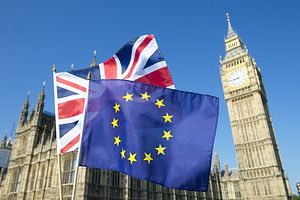On June 23, citizens of the United Kingdom voted in a national referendum on their continued membership in the European Union, ultimately choosing to leave. “Brexit,” as the event is known, has roiled global financial markets, causing widespread volatility and losses of over $3 trillion in equity value overnight. Meanwhile, the British pound has seen the largest recorded drop by any major world currency in recent history.
While the effects of Brexit will be acute for the United Kingdom, which stands to see its GDP growth slow down as a result of the referendum, the shockwaves of Brexit will ring globally. The states of the Asia-Pacific had almost unanimously advised the United Kingdom against leaving the EU. How can they expect to feel the geopolitical and geoeconomic consequences of Brexit now?
For China, the United Kingdom’s decision to eventually excise itself from the European Union’s common market will be a disappointing move. Chinese Premier Li Keqiang has taken a particular interest in the U.K., reciprocated in recent years by Chancellor of the Exchequer George Osborne. Last fall, London became the first international financial hub to issue renminbi-denominated debt after Xi Jinping’s visit there. Brexit will be a setback for the ongoing internationalization of renminbi as London’s relevance as a global financial hub is diminished as a result of Brexit. (As a side note, the onus on China’s economic stewards will be higher in the wake of Brexit—if the Chinese economy wavers like it did in mid-2015, the global consequences could be catastrophic on the back of Brexit.)
Brexit could also mark a setback for China’s long-term goal of a free trade agreement with the EU. London had emerged as one of the most eager advocates for a China-EU FTA; with the U.K. now exiting the bloc, none of the other major EU states seem keen to ink a deal with Beijing. An FTA with the U.K. alone might be politically simpler to negotiate (assuming Cameron’s embrace of Beijing is also adopted by his replacement as prime minister), but won’t have nearly the same economic benefits for China.
The geopolitical consequences for China could be more mixed. Brexit, no doubt, will seize global attention and news cycles for the weeks to come. With summer tensions rising in the South China Sea, Beijing may find that a news cycle focused on international financial turmoil dulls the reputational damage of an adverse ruling at the Permanent Court of Arbitration, expected any day now. Finally, with London looking inward, Prime Minister David Cameron’s successor may show even less of an interest in a forward-leaning U.K. presence in the Asia-Pacific’s strategic environs. (A Brexit also considerably dulls the European Union’s capabilities as a security actor, leaving France as the sole large and capable military.)
For Japan, Brexit is something of a disaster. Specifically, a bad year looks to be getting worse for Prime Minister Shinzo Abe and Bank of Japan Governor Haruhiko Kuroda. As the pound plummeted during the counting of results, the yen appreciated considerably, posing a challenge for the broader Abenomics agenda. Kuroda had chosen to break new ground with monetary policy, choosing to implement negative interest rates earlier this year. Japan’s monetary options may be tied and the only option now may be foreign exchange intervention—something the United States had warned against. For Abe, one small silver lining for Brexit may be that the ensuing global financial chaos will offer a convenient political alibi for the causes of Japan’s own economic dysfunction.
Meanwhile, in South Asia, Indian reactions to Brexit are somewhat mixed. The official reaction is cautious. Indian Finance Minister Arun Jaitley, in a statement, notes that the “verdict will, obviously, further contribute to … volatility not least because its full implications for the U.K., Europe and the rest of the world are still uncertain.” India, with its still-impressive growth rates, remains the one large emerging economy able to satisfy investors. The looming threat of a rise in global interest rates—particularly repeated rate hikes by the U.S. Federal Reserve—threatened to counter India’s momentum. With the ongoing uncertainty in global markets after Brexit, interest rates worldwide should continue to remain low, ostensibly helping India maintain momentum. For India, the downside risk of Brexit is in the effect it could have on major multinational corporations, such as the Tata Group, who operate several subsidiaries based in the U.K. A U.K. detached from Europe could lead to depressed revenues, potentially feeding back into the Indian economy more broadly.
In Southeast Asia and Oceania, Brexit is a worrying development, likely to contribute to uncertainty and financial volatility, but may present opportunities. The United Kingdom exports around $15 billion to the Southeast Asian market and a depressed pound could help savvy Southeast Asian economies seize on an opportunity. Malaysia, a former British colonial possession, has indicated its willingness to negotiate a free trade agreement with a post-Brexit U.K. Australia, meanwhile, is playing it cool. Prime Minister Turnbull has said he thinks the Australian economy will avoid the worst contagion of Brexit’s financial shockwaves: “It is important to remember that the Australian economy is strong and resilient, and has weathered global shocks before and weathered them well.”
































